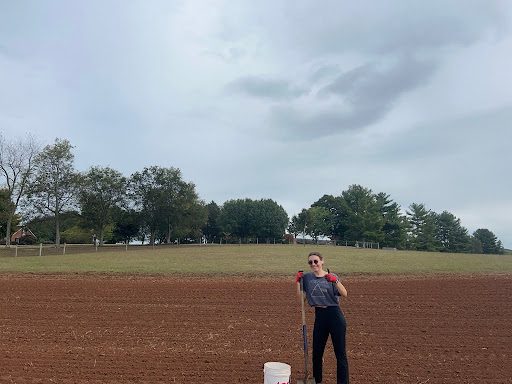
Caitlin Dalton, a graduate student in plant sciences, received the Sustainable Agriculture Research and Education (SARE) grant for her research on Trichoderma, Fusarium wilt, and their effects on tomato production.
Dalton heard the news that she received the grant in August 2023. She was thrilled, to say the least, for the grant will not only fully fund her research but will also support hourly wages as she earns her master’s degree. She expressed, “It felt great to get a win.”
A Bristol-area native, Dalton started her journey at the University of Tennessee as an undergraduate student in food science, but changed her major to plant sciences after taking PLSC 115: Plants that Change the World. She spoke of the friendly atmosphere on the agriculture campus and how she experienced a great support system from day one.
After earning her bachelor’s degree, Dalton joined David Butler’s lab for graduate school. Her research project, for which she received the research grant, is titled “Role of local Trichoderma spp. isolates in reducing tomato Fusarium wilt and increasing phosphorus uptake.”
Trichoderma is a well-known beneficial fungus among plant and soil scientists. It can parasitize other pathogens and also act as a bio-fertilizer enhancer for nutrients. Most studies of Trichoderma as a nutrient enhancer focus on nitrogen. Dalton’s study is more uniquely focusing on its effect on phosphorus uptake in conjunction with Fusarium oxysporum, or Fusarium wilt, a pathogen often detrimental to tomato production.
“We chose this because my lab focuses on organic production and the relationships between plant and soil fungi.” Dalton explained, “Fusarium and phosphorus are both major limiting factors for tomato production, especially in organic systems, so we want to see how various local strains of Trichoderma could increase phosphorus availability and plant resistance to Fusarium wilt.”
According to Dalton, the idea was to take “a whole systems approach to benefit farmers and production.” Because tomatoes are one of the most widely cultivated vegetable crops in the world, using culturable fungi like Trichoderma to combat soil-borne pathogens would yield positive outcomes for tomato production on a global scale.
Dalton’s future plans involve working in a position that “upholds her values of sustainable agriculture.” She said, “I want to have a career where I feel like I am able to help others and encourage sustainable agricultural practices. I am grateful to have such a well-rounded project with so many different factors because I have been able to gain so much knowledge and experience both in the lab and greenhouse.”
Dalton expressed her gratitude toward Herbert College of Agriculture faculty and mentors John Stier, Natalie Bumgarner, and Kellie Jean Walters. She also thanked Butler for helping her with everything from writing her grant proposal to realizing graduate school “was even an option.”
